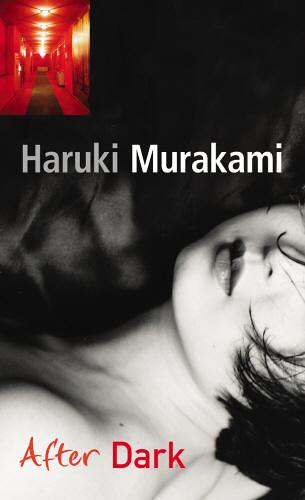Tuesday, June 05, 2007

Title:After Dark
Author: Haruki Murakami
Publisher: Harvill Secker
Minutes to midnight. A girl in a family chain restaurant. A thick book, a cooling coffee. The last train has gone. She is settling down for the night. A world of her own, motivations of her own. Enter a scraggly young man. Long haired, a scar across his face, carrying an instrument. A waitress leads him to a table, but he stops. The girl looks up. This young man is looking at her - I know you, we met, your sister was in my year at school. Uninvited he joins her. A journey starts after dark.
Mari had planned just to spend a night away from home. But with Takahashi's intervention the night is changed. Jazz bars, love hotels, lonely parks and all night convenience stores provide the landscape. Interspersed with this are strange sequences, Mari's sister Eri sleeps, perhaps dreams, is transported somewhere else entirely.
Haruki Murakami is a curious writer, and After Dark feels curious even by his standards. The idea of women in his novels is a recurring one, frequently his lead character is a man in love with a woman, searching for a woman - so often women who have vanished, who are about to vanish. In any of his other novels Takahashi would have been the lead character, instead, undoubtedly it is Mari who is the lead, and I am struggling to think of any of his other novels where that has been the case.
Perhaps that explains the bigger curiosity? That of the narrative voice. Murakami writes in a sort of second person with After Dark. A conspiratorial voice, that brings the reader in, makes them included in the progression - references to view point, camera shots. At times this feels voyeuristic, especially with the Eri sequences, though it is made clear that we as reader can't affect what we are seeing. By the same degree this approach can at times feel a little distancing, artificial. The second person voice is a curiosity, so rarely used that it is a novelty. But with that we can see the reasons for not using it; it often does not sit right with the reader, and can feel gimmicky and distracting.
One thing that strikes me with After Dark is an irony. I introduced a friend to Murakami a few years ago, at the same time she introduced me to Richard Brautigan. The first novel I read by Brautigan was Sombrero Fallout: A Japanese Novel, in which a writer tries to write, but struggles due to a pre-occupation with his girlfriend who has just dumped him. Throughout the novel the story is interspersed with scenes of his ex-girlfriend, a Japanese woman, sleeping a strange and restless sleep. Reading Sombrero Fallout I could see Brautigan as a kind of kindred spirit to Murakami. Now reading After Dark, the whole Eri strand, a beautiful Japanese woman sleeping an extraordinary sleep, seems almost to be a direct reference to Sombrero Fallout.
Apart from that, After Dark has many of Murakami's themes through it. Mari could be compared to Kafka On The Shore's runaway, Takahashi perhaps the runaway’s spirit guide, a conscience who transforms Mari's night and transforms her in the end. Or Eri could be taken as Sputnik Sweetheart's missing girl, a heavy presence that comes up again and again, and yet creating a void at the same time.
After Dark is an understated novel, where it could be said that very little happens in the course of this one night. There is an ambiguity about sleeping Eri, which can be off-putting. But over all this is a quietly readable novel, its 201 pages an easy read, and Mari's story being the thread that keeps the pages turning and the reading enjoyable.
Comments:
Post a Comment
 this is the voice of re:mote induction.
this is the voice of re:mote induction.